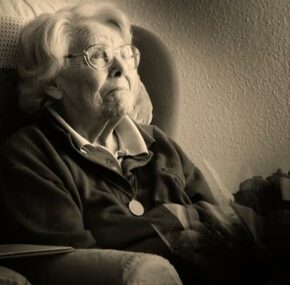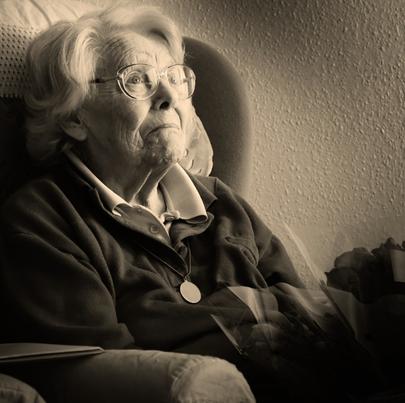Nursing homes and long-term care facilities that receive Medicare or Medicaid funding are required by federal and state laws to provide residents with a basic standard of care. If that standard of care is breached and results in a resident’s illness, injury, or death, legal rights allow for suing a nursing home for neglect leading to death.

What Leads to Nursing Home Neglect?
Nursing home neglect is defined as elder abuse that is caused by a lack of care and results in illness, injury, or death to a nursing home resident. Although federal and state laws require a basic standard of resident care in nursing homes funded by Medicare or Medicaid, it’s estimated that 40% of residents in these facilities are victims of nursing home neglect.
Unlike nursing home abuse, which usually results in visible physical injuries, nursing home neglect often goes unnoticed because it is related to a lack of basic care. In elderly adults, a lack of basic care can quickly lead to major health problems with existing conditions, increased illnesses, external and internal injuries, and even death.
Nursing home neglect is caused by the neglect of a resident’s basic needs which includes shelter, clothing, food and water, sanitary living conditions, personal hygiene, and necessary medications. When any of these basic needs are neglected or not provided, a resident can suffer a variety of serious health problems and even death. Such cases warrant legal actions that include suing a nursing home for neglect leading to death.
In many cases, nursing home neglect is caused by nursing home policies, procedures, and practices, as well as the conduct of individual nursing home employees. Common problems that lead to neglect include:
- Negligent hiring
- Negligent supervision
- Failure to provide basic necessities
- Failure to provide adequate medical treatment
- Failure to keep the premises free of hazards
- Failure to maintain health and safety policies
Under the law, a violation of any of the above requirements can result in penalties by federal and state agencies, including documented violations, monetary fines, and temporary or permanent closure of a nursing home facility. When violations lead to nursing home neglect and resident injuries or death, they are likely to result in a civil lawsuit filed by a nursing home abuse lawyer seeking damages against the at-fault party. The at-fault party can include the nursing home facility or the at-fault staff members and caregivers.
What Are the Most Common Types of Nursing Home Neglect That Lead to Death?
Nursing home neglect comes in many forms. Whether it is caused by faulty nursing home procedures and practices or nursing home employees and caregivers, it can lead to resident illnesses, injuries, and deaths. The most common types of neglect that lead to deaths include:
Neglect of Basic Needs
Typically, elderly residents in nursing homes are suffering from numerous existing medical conditions related to advanced age. The neglect of their basic needs, like adequate nutrition, good hygiene, and a sanitary living environment, can result in serious health problems that lead to death.
Nutrition
The lack of adequate amounts of daily food and water can lead to malnutrition and dehydration. Malnutrition can lead to weight loss, muscle weakness, extreme fatigue, dental problems, and chronic illnesses. Dehydration can lead to dizziness, low blood pressure, increased breathing, sunken eyes and cheeks, mental confusion, and unconsciousness. If your loved one dies from malnutrition or dehydration in a nursing home, it’s important to talk to an attorney about suing a nursing home for neglect leading to death.
Hygiene
Poor hygiene in elderly adults can be extremely dangerous due to immune-compromised conditions. Lack of good hygiene like daily bathing, hair washing, tooth brushing, bandage changes, and diaper changes can result in an onslaught of dangerous germs getting passed from one resident to another, as well as to nursing home staff members. Poor hygiene and germs can easily lead to deadly conditions such as bed sores, skin infections, and sepsis in vulnerable nursing home residents.
Environment
Living in unsanitary conditions leaves nursing home residents especially vulnerable to a variety of dangerous health conditions including respiratory infections, soft tissue infections, and urinary tract infections that spread quickly in a nursing home setting. It’s reported that one-third of nursing home residents develop respiratory infections that lead to lung diseases, pneumonia, and life-threatening illnesses that lead to death.
Neglect of Medical Care
Proper medical care for nursing home health conditions is essential to prevent life-threatening complications in elderly adults. When a resident’s medical care is ignored or neglected due to budget cuts, understaffing, lack of supervision, or untrained caregivers, minor health problems can quickly turn into serious health problems that may lead to death and suing a nursing home for neglect leading to death.
Medical neglect occurs when a resident’s medical conditions are omitted or ignored. Common deadly conditions include a diabetic coma resulting from failure to administer insulin shots, bedsore and skin infections resulting from a resident’s immobility, heart attacks, strokes, and respiratory distress resulting from failure to give medications.
Medication Errors
Medication errors in nursing homes are a common problem and a leading cause of health complications that lead to death. To reduce error rates and prevent deaths, state inspectors that perform nursing home inspections must identify each facility’s medication error rate during an inspection. According to law, medication errors must remain below an acceptable percentage standard. If the error rate rises above that standard, the nursing facility must create a plan to correct those errors.
Sepsis
Sepsis is a common and often deadly problem in nursing homes. Sepsis is a form of blood poisoning that’s caused by bacteria. It is considered a life-threatening emergency when a chain reaction in the body is triggered by an infection. Without immediate medical treatment, sepsis can lead to organ failure, tissue damage, and death. In nursing homes, sepsis has a death rate of up to 50% because it can quickly spread in a nursing home environment. Immediate medical diagnosis and treatment are critical.
Most cases of sepsis start as bacterial infections that go untreated, so it’s important to understand how to sue a nursing home for neglect. Although sepsis is not contagious, the infections that cause sepsis can be, so nursing homes must promptly treat them to prevent an outbreak. Age is the number one risk factor for developing sepsis, and elderly adults are five times more likely to develop a severe, life-threatening case of sepsis.
Neglect of Emotional and Social Support
Neglect of emotional and social support happens when a nursing home resident is ignored, left alone, or isolated from other residents and outside visitors. Nursing home residents who experience these conditions commonly suffer from serious anxiety, depression, suicidal tendencies, and aggressive behaviors toward other residents and caregivers.
Nursing home residents who are diagnosed with Alzheimer’s, dementia, or other cognitive impairments or who do not have regular visitors or activities are twice as likely to display symptoms of emotional and social neglect. If you have a family member or friend in a nursing home, it’s important to look for signs of emotional and social neglect and report it to Adult Protective Services (APS), a Long-Term Ombudsman, or local law enforcement.
Watching for signs of neglect, reporting suspected mistreatment, and moving your loved one to a different nursing home can prevent severe emotional trauma and isolation that may lead to premature death.
What Must You Prove when Suing a Nursing Home for Neglect Leading to Death?
When nursing home neglect occurs, you are entitled to file a lawsuit against the responsible nursing home facility, staff members, and caregivers who participated in neglectful actions that caused harm. If nursing home neglect results in death, family members of the deceased are entitled to file a wrongful death lawsuit on the decedent’s behalf. Suing a nursing home for neglect leading to death is a way to collect compensation to pay for your loved one’s medical expenses, funeral expenses, and loss of consortium.
When a nursing home resident suffers illness, injury, or death, the cause and the responsible party are not always obvious. An investigation may be necessary to determine the cause of illness or injury. If death occurs, you should request an autopsy when your loved one dies in a nursing home.
Nursing home neglect cases can be complicated. Before you decide to file a lawsuit, you should talk to an attorney who handles nursing home neglect and abuse cases and understands federal and state laws that have a bearing on your case. An attorney with experience in nursing home lawsuits can gather necessary evidence to ensure successful case results and help you determine how much a nursing home abuse case is worth.
Since nursing homes funded by Medicare and Medicaid have strict federal and state regulations, you must show proof when suing a nursing home for neglect leading to death. Nursing home neglect cases require proof of physical, emotional, and financial losses. Depending on the type of claim you file, evidence to show proof may include the following:
- Medical expenses for treatments and prescription medications
- Medical records and physicians’ notes
- Personal journal notes
- Photographic and video evidence of neglect
- Insurance claim documents
- Proof of your relationship to the injury or fatality victim
To show proof of nursing home neglect or abuse in court, you must prove four important legal issues: 1 – the nursing home is responsible for meeting a general and medical duty of care; 2 – the nursing home either intentionally or negligently breached its duty of care; 3 – the breach of duty of care caused injury or death; and 4 – the patient’s injury or death resulted in financial losses.
Suing a Nursing Home for Neglect
If you have a family member in a nursing home, it’s essential to have power of attorney (POA) documents in place, especially if the family member has Alzheimer’s or dementia. If your loved one loses his or her ability to communicate about nursing home problems such as mistreatment or neglect, you must be prepared to step in on your loved one’s behalf. Having power of attorney allows you to file a nursing home neglect lawsuit in court.
A POA document can be temporary or permanent. It can become effective immediately or take effect only if your loved one becomes unable to act on his or her own behalf due to an injury or disability. There are two main types of POA: a Medical or Healthcare POA which allows you to make healthcare decisions, and a Financial POA which allows you to make financial decisions. When creating a POA document, it’s important to discuss it with a nursing home attorney who understands state laws.
State Laws and Regulations
Nursing homes and businesses that care for elderly adults and accept Medicare or Medicaid payments are required to adhere to federal regulations regarding elder care. In addition, some states have extra regulations and stricter requirements than federal guidelines. Federal and state regulations are in place to ensure quality nursing home care and protect nursing residents from harm.
Areas of regulation include common issues including standards of care, resident complaints, facility licensing requirements, staff training standards, and maximum staff turnover rates.
Some states have laws that criminalize nursing home abuse and neglect and financial exploitation. In some states, elder abuse is considered a mandatory felony. If you suspect nursing home abuse or neglect in an Illinois nursing home facility, work with a nursing home neglect attorney who practices in Illinois. States have different rules and consequences regarding who is legally required to report elder abuse, what activities require reporting, and how they must be reported. States also have different limits on damages that can be awarded in civil lawsuits.







